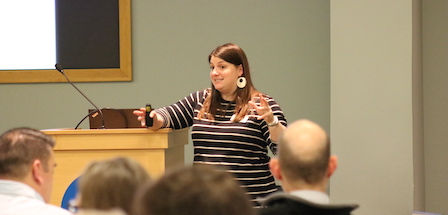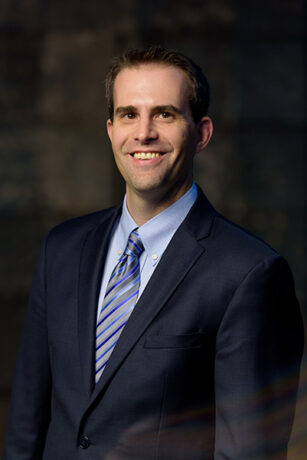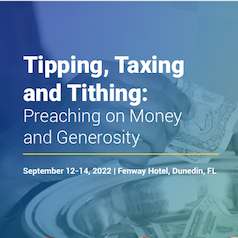Simple Gifts
Simple Gifts
 by Melissa Spas
by Melissa Spas
Melissa Spas has served Lake Institute on Faith & Giving as Managing Director for the past six years. She has recently accepted a new position as Vice President of Religion at Chautauqua Institution and will soon be leaving Lake Institute for this exciting role. She shares here a few reflections on what she has learned over these past years.
In my time working at Lake Institute on Faith & Giving, I have been the beneficiary of considerable generosity, and that experience has taught me a great deal. As I prepare to leave Indianapolis and join the staff of Chautauqua Institution, I have been reflecting on the past six years of work in faith and philanthropy and all that I have learned. I think of these lessons as some “simple gifts” at the heart of religious philanthropy, profound and yet fundamental to the practice of faith. As the Shaker folk song, popularized by Aaron Copeland, says:
‘Tis the gift to be simple, ’tis the gift to be free
‘Tis the gift to come down where we ought to be,
And when we find ourselves in the place just right,
‘Twill be in the valley of love and delight.
When true simplicity is gained,
To bow and to bend we shan’t be ashamed,
To turn, turn will be our delight,
Till by turning, turning we come ’round right.
Thinking of these simple gifts, I wish to express my gratitude to the Lake Institute community and share some of the lessons I will carry with me.
Power of Relationship
It will come as no surprise to anyone who knows me that the first gift I celebrate is the profound power of relationship. When we take time to listen well, to practice discernment together, to learn about one another’s commitments, hopes, and anxieties, then we can nurture generosity and invest in the future. I have been honored to be invited into relationship with my remarkable colleagues as well as creative religious leaders and the institutions that they serve. Relationships take time and attention, but the fruit they can bear is remarkable, and begins with the smallest seeds. Attention to faith and philanthropy is necessarily relational, and that recognition empowers work that expands beyond a transaction or goal, to really address the mission and meaning of religious work.
Willingness to Take Risks
Connected to this relational priority is the recognition that a robust conversation about faith and giving depends upon the willingness to take risks, because integrity demands that we not only consider the current moment, but also the weight of inheritance. This means that, yes, we celebrate the gifts we receive from our ancestors, and also consider the fullness of their legacy. This may require a more painful reckoning with privilege or injustice than anticipated but identifying this dimension of individual and institutional history can also free up a new kind of conversation about resources and our relationship to them. Nothing ventured, nothing gained, and again and again I have been witness to the risks taken by religious leaders, people of faith, and philanthropists as they practice generosity, particularly in service of more justice and equity in the world.
Appreciation for Generosity
This leads to the next lesson I’ve learned, which is an appreciation for generosity in many forms. Every individual brings their own contextual perspective, and an expanded imagination for faith and giving requires an openness on the part of individuals and institutions. Generosity is not determined by the scale of a gift, or by its impact on the beneficiary. Generosity is not static, but changes in the practice of a giver, and in the life of an organization over time. Christian Smith and Hilary Davidson’s consideration of generosity stays with me, because it is in the social science analysis that I was prepared to recognize the beautiful diversity of giving that I’ve been privileged to encounter. Sometimes generosity has nothing to do with material support but is grounded in the way we relate to one another, sharing knowledge, enthusiasm, and vulnerability. Generosity beyond the conventional major gift is worth noticing because its presence can be transformative, not only for the beneficiaries, but for the ones engaged in giving as well.
Counter-Cultural Work
I have also learned that addressing economic questions with a spiritual lens can be counter-cultural. When people of faith really consider the previous three lessons about giving – relationships, risk-taking, and diverse expressions of generosity – it is also likely that they will bump up against some powerful cultural norms. Critique of economic practices and consideration about the place of money in our lives have been limited in many religious spaces; starting new conversations and connecting theology with money talk may be disruptive. I have also seen the imagination and energy that comes from engaging in that discernment, reorientation, and disruption, and I believe that it is a worthwhile effort, and one that has implications that transcend the narrow focus on economics or money.
For me, this farewell as I move to Chautauqua, my hometown, is proving to be a meaningful “turning” in my life, an important pivot. I will carry with me these lessons learned and I hope that in all my work, I might pursue simplicity, freedom, and the opportunity to “come ‘round right.” My colleagues at Lake Institute and all of you have been wonderful teachers and friends to me, and that is a gift indeed.
Questions for Reflection
- What are some of the simple gifts you’ve gained from working in the field of faith and giving?
- As you reflect on the gifts Melissa named above, how have you experienced Lake Institute adding these gifts to your work too?
Expanded Perspective
 Giving Thanks
Giving Thanks
by David P. King, Ph.D.
Melissa Spas has been a gift to Lake Institute. Her work in shaping our organization follows the simple gifts that she highlights in her own words above. Through her example, she has constantly demonstrated how the power of relationship, risk-taking, and creativity is central to this work. Undoubtedly, many of you reading these words have set across a table, shared a cup of coffee, or sat in on a zoom call with Melissa asking insightful questions about you and your organization that have led you to new ways of embracing your own vocation and mission.
Melissa is a generosity connoisseur. She draws our attention to the gifts we have received and challenges us to appreciate generosity in all its forms. She reminds us to pause and savor the gifts we have been given. She models how to put into practice habits of living a life of generosity.
She is also a consummate encourager to those of us in this work making it clear that we too can embrace these practices of generosity that are often so counter-cultural in the world in which we live. For many of us, fundraising and exploring the intersection of faith and money were not at first easy topics to address. But Melissa has encouraged us to embrace these issues as central to our work as leaders, not only focusing on the money but even more so focused on the mission of our organizations. She has encouraged us to be creative – to think outside the box – even while also being rooted to our particular contexts, traditions, and communities. She has also not shied away from encouraging us to attend to the ways in which generosity is interwoven with justice, making sure that our work focuses an ever present eye for the transformation and healing of the world in which we live. Tough topics like faith and money require a steady hand and encouraging, persistent, and pastoral presence. That is a regular gift that Melissa has offered the Lake Institute community.
The work of Lake Institute is without a doubt so much richer because of the fingerprints that Melissa has left throughout our work. While we miss her daily presence with us, we are grateful for the new opportunity she will have at Chautauqua Institution to continue to shape religious leaders and their work in the world. And on behalf of all those that you have impacted through Lake Institute, we want to say thank you.
Summer Office Hours
 Drop in for conversation with Lake Institute on Faith & Giving and your fellow leaders in congregations and religious nonprofit institutions. Bring your questions and your experiences to a virtual roundtable exchange of ideas. All are welcome to each session, but topics of conversation will center around different issues of faith and giving each week.
Drop in for conversation with Lake Institute on Faith & Giving and your fellow leaders in congregations and religious nonprofit institutions. Bring your questions and your experiences to a virtual roundtable exchange of ideas. All are welcome to each session, but topics of conversation will center around different issues of faith and giving each week.
Register today
Institute on Preaching
 How can preaching do more than beg for money? How can preaching about money and generosity help people grow in their discipleship?
How can preaching do more than beg for money? How can preaching about money and generosity help people grow in their discipleship?
This workshop on preaching on money and generosity will equip preachers to help their congregations experience financial generosity as an essential part of discipleship. Join Lake Associate Director, Meredith McNabb, Lake Adjunct Faculty, Nathan Kirkpatrick, and recent guest Insights writer, Jim Harnish, in Florida this September!
Subscribe
Insights, a bi-weekly e-newsletter, is a resource for the religious community and fundraisers of faith-based organizations that provides:
- Reflections on important developments in the field of faith and giving
- Recommended books, studies and articles
- Upcoming Lake Institute events
